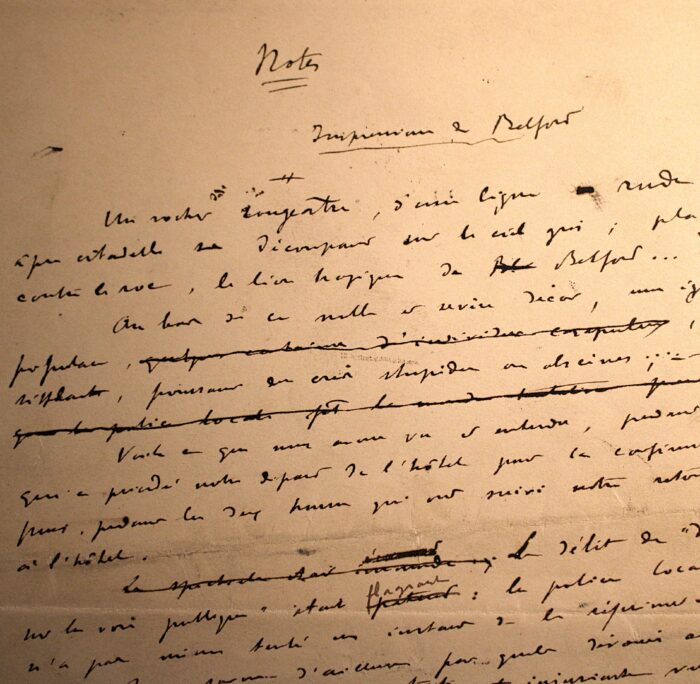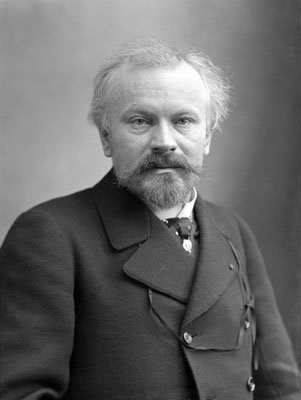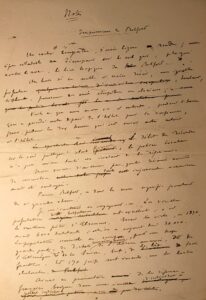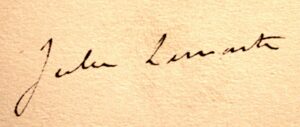Jules Lemaitre (1853-1914), writer, academician, figure of nationalism. Notes – Impression de Belfort. [No place, 1902]. Signed autograph manuscript, with deletions and corrections. 3 pp. in-8° on 3 ff. recto only.
Draft of the article that Jules Lemaître, on an election tour in Belfort during the legislative elections in support of the outgoing nationalist congressman Armand Viellard, will publish in the patriotic newspaper L’Echo de Paris. Lemaître and Godefroy Caraignac, leaders of the Ligue de la Patrie française (League of the French Fatherland), had been conducting a propaganda campaign in all the major cities of France since November 1901 to support nationalist candidates.
Violent text against the inhabitants and the city of Belfort, with anti-Semitic and xenophobic undertones.
« Un rocher rougeâtre, d’une ligne rude ; une âpre citadelle se découpant sur un ciel gris ; plaqué contre le roc, le lion tropique de Belfort… Au bas de ce noble et sévère décor, une ignoble populace, hurlant, sifflant, poussant des cris stupides ou obscènes… Voilà ce que nous avons vu et entendu, pendant l’heure qui a précédé notre départ de l’hôtel pour la conférence, puis pendant les deux heures qui ont suivi notre retour à l’hôtel. […] Nous savons d’ailleurs par quels dévoués amis du ministère toute cette injurieuse vermine avait été soudoyée. Pauvre Belfort – dont le nom signifie pourtant de si grandes choses ! […] La vieille population belfortaine est excellente ; c’est la meilleure pâte d’Alsaciens. Mais la ville, en 1870, avait 6 000 habitants ; elle en a aujourd’hui 30 000. La population nouvelle se compose, pour une trop grande part, de déchets humains venus de l’Alsace annexée, de l’Allemagne ou de la Suisse, bref, de la lie de trois frontières. Et 170 Juifs sont inscrits sur les listes électorales. Ainsi ce promontoire de la défense française baigne dans une écume d’individus à patrie indécise. Nous avons bien fait d’y aller. La liberté de conscience, la liberté d’association, la liberté d’enseignement ont été rayées du code. [Il ne reste que la liberté de parole et de réunion. En fait, le ministère fait tout ce qu’il peut pour l’entraver. Mais, tout au moins, elle demeure inscrite dans la loi. Nous avons montré, à Belfort, qu’on peut encore user de cette liberté là, à condition de la défendre soi-même. Nous avons fait à pied quatre Kilomètres, aller et retour, sans autre inconvénient que le petit ennui d’entendre ici ou là quelques sifflets imbéciles que nous couvrions aussitôt du chant de la Marseillaise. Cette longue promenade a été possible, et même facile, grâce à la décision calme des vieux belfortains. Ils ont protégé, dans ma personne, une liberté. Nous leur avons apporté une occasion de se serrer les coudes, de se rallier tous pour la bonne cause. Echange de fraternels services.
Suit l’exposé d’idées générales politiques concernant son parti de droite, ses électeurs, le soutien qu’ils lui témoignent ainsi qu’à Godefroy Caraignac et au général Mercier. « C’est que la plupart de nos amis sont des hommes qui n’ont encore jamais fait de politique. A cause de cela ils ont de la simplicité et de la candeur. […] Ils ont le bon sens. Et, je crois, de plus en plus, qu’ils sont le nombre. »
[“A reddish rock, with rough lines; a harsh citadel silhouetted against a grey sky; pressed against the rock, the tropical lion of Belfort… At the foot of this noble and severe backdrop, a vile mob, shouting, whistling, uttering stupid or obscene cries… This is what we saw and heard during the hour before we left the hotel for the conference, and then during the two hours after we returned to the hotel. […] We also know which devoted friends of the ministry had bribed all this abusive rabble. Poor Belfort – whose name means so many great things! […] The old population of Belfort is excellent; it is the best stock in Alsace. But in 1870, the city had 6,000 inhabitants; today it has 30,000. The new population is composed, for the most part, of human refuse from annexed Alsace, Germany, or Switzerland—in short, the dregs of three borders. And 170 Jews are registered on the electoral roll. Thus, this bastion of French defence is awash with individuals of uncertain nationality. We did well to go there. Freedom of conscience, freedom of association and freedom of education have been removed from the code. [Only freedom of speech and assembly remain. In fact, the ministry is doing everything it can to hinder it. But at least it remains enshrined in law. In Belfort, we showed that this freedom can still be exercised, provided that we defend it ourselves. We walked four kilometres there and back, with no inconvenience other than the minor annoyance of hearing a few idiotic whistles here and there, which we immediately drowned out by singing the Marseillaise. This long walk was possible, and even easy, thanks to the calm decision of the old people of Belfort. They protected a freedom in my person. We gave them an opportunity to stand together, to rally around a good cause. An exchange of fraternal services.”
This is followed by a presentation of general political ideas concerning his right-wing party, its voters, and the support they show for him, Godefroy Caraignac, and General Mercier. “The fact is that most of our friends are men who have never been involved in politics before. Because of this, they are simple and candid. […] They have common sense. And I increasingly believe that they are in the majority.”]
A document of rare violence in the Comtois region, bearing witness to the rise of a xenophobic and anti-Semitic right wing in a France torn apart by the Dreyfus affair.
650 €




